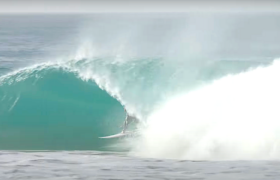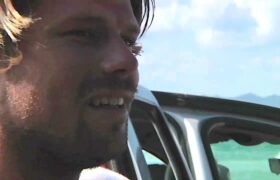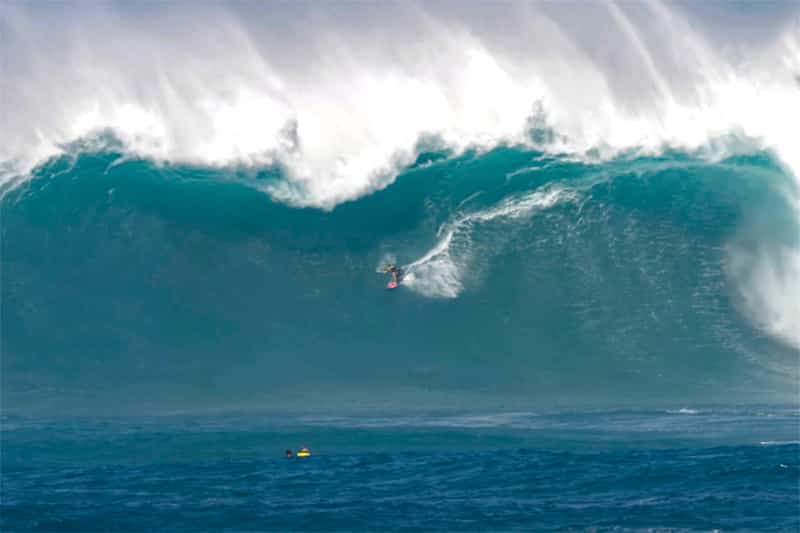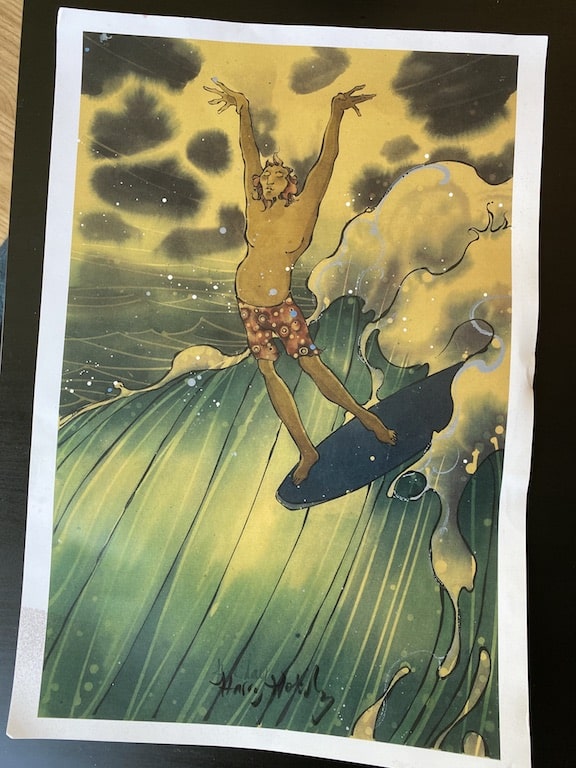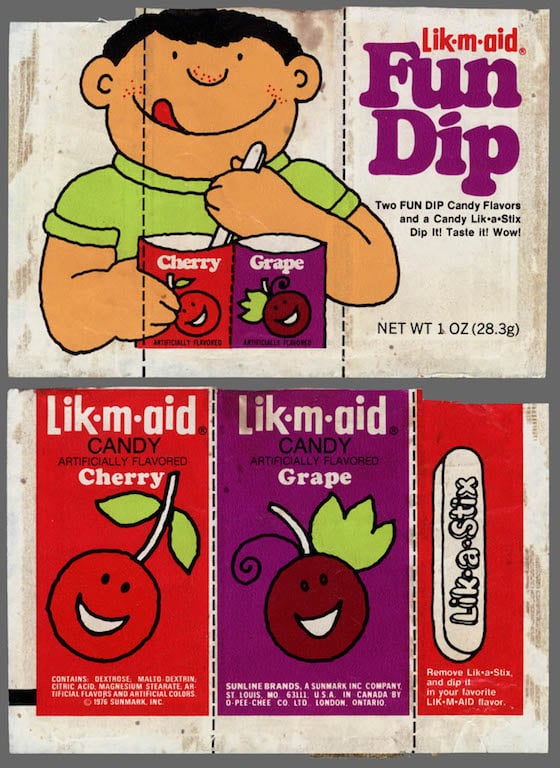Courage, insouciance and a true belief somehow unite Islamic radicalism, surf culture, war, American decadence and the hunt for true adventure in this very funny book.
Fifty-five dollars I paid. Hard cover.
Ordered it in and had to wait weeks like a custom board for it to show up, all the way from America.
“Fifty-five dollars hey,” the babe at the counter of the Lennox book shop smirked at me. “What? You gone off your fuggen Russians?”
“Nah, nah” I waved a little penguin copy of Dostoevsky’s “White Night” at her as rebuttal.
“It’s just, Chas,” I pointed at the name printed in yellow under the Title “Reports from Hell”, “is a kind of colleague, boss and I wanted to pay full tick so the cunt wouldn’t feel I was treating his book kindly because I got it for free”.
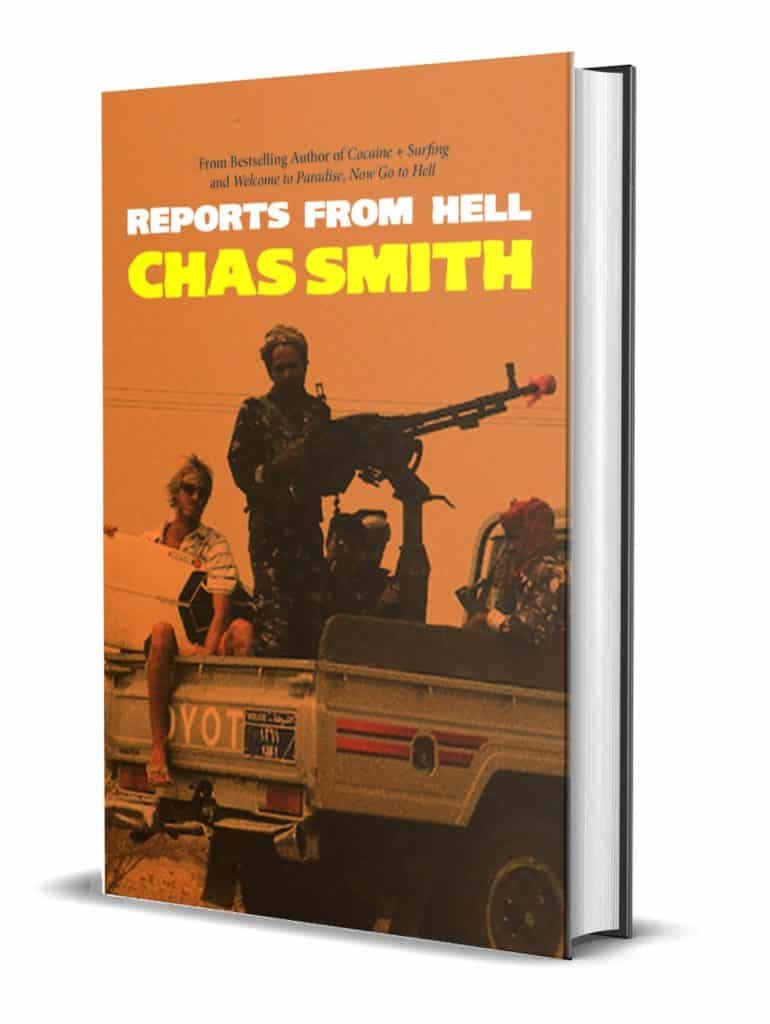
“Ah, yep” she nodded, “the reviewer’s curse”.
I paid overs because I wanted no bias.
If I got gypped, then I could feel justified in giving it to Chas, full blast. Also knowing: when I take up my 80 grand (plus benefits) package at the WSL he could go after me without kid gloves. I hate kid gloves.
Reports from Hell is a very funny book, a rollicking adventure yarn, geopolitical exposition and chronicle of a period in recent history that already feels incredibly ancient. I refer to the post 2001 War on Terror, whereby the West, principally the United States of America referred to by Al Qaeda as the far enemy, invaded the Middle East as retribution for September 11 and caused a conflagration that the World is still coming to terms with.
The basic narrative outline of the book follows Smith and his pals as they make multiple journeys – more than journeys actually, more like the Homeric odysseys of old – to the Middle East in search of the well-spring of Islamic terror, or what his pal Josh more accurately terms: the roots of violent, anti-state radicalism.
The twist in the tale, as we all know, is that Chas combines the search for the roots of Islamic terror with a surf trip. This leads to some very funny scenes. Successfully pitching Surfer mag editor Sam George to bankroll the trip is a highlight of the opening chapters of the book.
The prologue where Smith both interviews and regales former US commander David Petraeus with tales of surfing in Yemen is classic Chas Smith. The prologue ends with a piece of prose which can be regarded as peak Chas: “I have seen and experienced a world vanished forever by an epic explosion, and as General Petraeus starts to drone on about Saudi Arabia being our great ally and a great investment opportunity, I put my Tom Ford sunglasses on, slouch deeply in my chair, and stare into the burning klieg light”.
The prologue hooked me, but one of my terrible weaknesses is reading the ending of a book after I’ve read the first beginning to see whether the juice justifies the potential squeeze, so to speak. Reading a book is a substantial investment of time. Smith’s final line is a classic too, a commitment to a life as a “violent anti-state surf journalist”. I knew I would finish the book after reading it.
That last line, and the book as a whole, can be read both as a prequel to Smith’s surf journalism career and the modus operandi of said career. It illuminates the rambunctious fixation on the superficial which somehow uncovers the swirling morass of absurdity below. Seen through that prism a surf trip to Yemen with a side mission to discover the well-spring of Salafi jihadism in one of the most violent countries on earth makes a weird but perfect sense.
I spent the opening chapters with some unease about whether I would find Smith’s travelling companions Josh and Nate likeable enough to enjoy the book. Soon enough though these fellow young Christian Americans revealed themselves to be perfect foils for the main narrator.
That Christian innocence and lack of depravity did strike me as odd through the opening stanzas, somehow I expected more sex, drugs and rock and roll from our protagonists. Scenes where the guide, driver and protector of the first trip to Yemen, Major Ghamdan is keen on some whoring while the Americans shake their fingers at him in moral disgust have a peculiar comic flavour from the inversion of expected values.
You’d expect the young Americans to be the ones sucked down by what Osama Bin Laden called “the most decadent culture in human history…corrupted by a depth of moral licentiousness never before seen.”
There are very many classic scenes chasing surf in Yemen with Major Ghamdan, which I think justify the price of admission alone.
Smith is very far from the only writer to employ provocation as a chief rhetorical weapon, even if in the chummy world of surf journalism back slapping, pocket pissing and mutual appreciation of flatulences are the far more accepted methods. By the measure of provocation, even if delivered in good faith, he is aligned more with both classic American satirist/humorists like HL Mencken and Mark Twain and more nihilistic European writers like Michel Houllebecq.
Houllebecq stated, “I admit that invective is one of my pleasures. This only brings me problems in life, but that’s it. I attack, I insult. I have a gift for that, for insults, for provocation. So I am tempted to use it,” adding in a later interview, “My desire to displease masks an insane desire to please”.
Without too much speculation, the same motivations could be applied to Smith. The list of stinks his provocations have landed him in is a long and legendary one. Mick Fanning, Rip Curl, the WSL, former BG writer Rory Parker, the Ashton Gogganses, many more I’ve forgotten and, most notably, Hezbollah.
A good chunk of the middle third of Reports from Hell is spent detailing the adventures of Chas and colleagues as war correspondents for an Al Gore internet channel when Israel invaded Lebanon. It’s very good, very funny, very tense writing. A send-up of classic war correspondents and a damn fine account of being taken hostage by Hezbollah during an actual war.
What makes Chas relish for the stink so comic is his lack of genetic gifts as far as the pugilistic arts are concerned. He looks, as my Grandaddy would say, like a “long streak of pelican shit”. Or, as my wife whose roots are in the swamps of Essex would say, “he’s all prick and ribs”. Which makes Smith less physically qualified to stare down Hezbollah bro’s or infuriated surf journos than it does to embrace designer jeans.
His development of a new genre of non-fiction, war fashion, with it’s delicate and detailed inventories of clothing and accoutrements pays homage to Bret Easton Ellis’ infamous character Patrick Bateman in American Psycho.
The final third of the book, carried out in an increasingly melancholy tone as the three protagonists began to disentangle and the various dreams and aspirations that had united their quest began to fade bought forth weird and conflicting feelings in me.
It took some time to identify them.
The War on Terror, as horrific as it had been, now seemed far enough back in the distant past to bring on a strange feeling of nostalgia. Nostalgia for a simpler time. And despite my intense fear of Islamic mobs, I felt strange yearnings to be among the goat herders and believers of Yemen.
Radical Islamic fundamentalism is the new alternative discourse claimed Josh at the beginning of the book. Despite the tale being told from the point of view of the Americanos it was increasingly the Yemenis and the Lebanese who’s positions I began to identify with.
That yearning for the pre-modern may be something more universal than accounted for.
Smith runs through a potted history of Islam, up to the development of Al Qaeda by Yemeni-Saudi Osama Bin Laden and Egyptian physician Ayman al-Zawahiri. My ignorance of this geopolitical as well as religious force had been as complete as my lack of knowledge of the surf potential of Yemen.
In a real sense, Reports from Hell, with Christian gents analysing the Middle East is a mirror image of the book the Father of Salafi Jihadism Sayyad Qutb wrote after returning to Egypt after two years in America. In his book, “The America that I have Seen” Qutb found American life primitive and shocking; he saw Americans as “numb to faith in religion, faith in Art, and faith in spiritual values altogether”.
It’s hard to say what Qutb would have thought of Smith and his pals but lacking in faith would not be a criticism he could level against them.
Courage, insouciance and a true belief somehow unite Islamic radicalism, surf culture, war, American decadence and the hunt for true adventure in this very funny book.
This is the first Chas Smith book I’ve read but I already know it’s by far the best.
For postage and handling I’m happy to send mine around.

